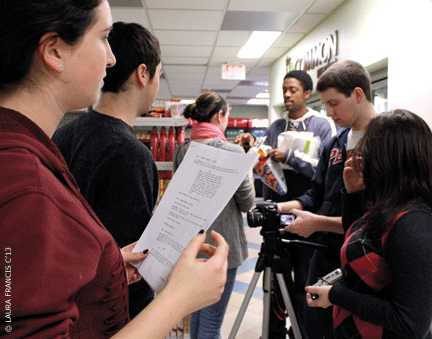
It’s Friday night at Penn, and on the 11th floor of Harnwell College House you might not realize you’re watching art imitate life—until you see sophomore Kelly Diamond over in the corner, her skinny arms holding up a boom microphone. The setting is prototypical dorm room: a crumb-strewn carpet marking the common area, a worn blue couch, a pod chair, and a few stray cushions loosely orbiting a TV that’s hooked up to an Xbox.
This is real life, but it’s also the set for “Classless,” a new student-produced sitcom that Diamond created this semester. After a February debut, she plans to produce a show every two weeks, to be broadcast on campus channel 13, and online through the Kelly Writers House website.
At the moment, though, she’s hunting for her copy of the shooting script, riffling through the stacks of books and paper heaped on the table—and most other flat surfaces in the room.
“Is it bad to put paper on the stove?” asks Jack Solowey, deadpan, watching her lift one pile off a burner. The sophomore was one of the first to join the project last semester, when it was still just a concept. Like Diamond, he moves fluidly between many roles: writer, producer, actor, and occasionally heckler-in-chief.
Solowey summarizes the first episode like this: “It’s about a student who’s looking to make some extra money and finds out about sperm donation. He goes through a bunch of different phases. Initially he’s excited, but then he examines the moral implications. He’s talking to his friends the whole time. He thinks he’s about to go through with it.” But when the moment of truth arrives, Solowey says, he finds himself unwilling to father a child he might never meet.
It’s a character arc that wouldn’t be out of place in a Judd Apatow movie—a story of unexpected innocence, infused with a moral sensibility that’s partially obscured by a few layers of gross-out sperm jokes and frat humor. Solowey helped write the script for the first episode, and he says he enjoys the sort of comedy that “points out absurdities in life.”
On the couch, Solowey and another actor are running through a few lines, trying to get the timing right. Jay, the episode’s protagonist, is just coming alive to the wonders of the sperm aftermarket: “Guys, don’t you realize that somewhere there’s a group of seedless lesbians dying to have a tiny, short-haired, Birkenstock-wearing baby who will eventually go to Vassar to major in gender studies?”
An outraged character named Canada then appears, to deliver a foaming rant against this expression of genetic entitlement, informing him that “under the Canadian healthcare system, you would be forcibly sterilized to protect us all from your spawn, and then we would put you in a socialist worker’s league and force you to build statues of Alex Trebek.”
Rewind about seven years, and you’d still find Diamond telling stories—not on camera, but on the middle school bus. She didn’t know it then, but two of her young listeners happened to be the children of Al Filreis, faculty director of the Kelly Writers House. Even then, she made an impression. “She’s just a hilarious storyteller,” Filreis says, “and both my kids would come home and say, ‘Kelly told another story.’ So I’d known about her for years.”
In high school, Diamond took advantage of an unusual yearlong creative writing class. That helped her build an early portfolio. When it was college admission time, Filreis says, “I asked for some of her work.” She handed him 150 pages.
On the strength of what he read, Filreis wrote her a recommendation to Penn, and became her advisor after she was admitted. “I didn’t even know I was recruited until I arrived at Penn,” says Diamond. Filreis was only getting started. He encouraged her to take Advanced Screenwriting as a freshman.
Filreis isn’t afraid to put some pressure on his talented recruits, but along with it comes a level of trust and support that’s rare in the world of academic advising. As Diamond puts it, “Al knows what I can do, and he knows what I can’t do.”
On one very wintry night in January, Diamond and the rest of the writers are tackling a different challenge: T-shirt design. Outside, heavy snow is coating the tree branches and sticking to the wrought iron fence outside the Writers House. Inside, up on the second floor, the writers room is a cocoon of warmth and light.
The meeting starts with an argument over sleeve length and logo placement. Unable to get funding from the Student Activities Council (which instituted a spending freeze in January), the production of “Classless” has been running on a shoestring. Selling T-shirts, Diamond says, would be a great way to raise some funds.
A meeting of comedy writers runs less like a board meeting, and more like a meeting of bored friends. The conversation noodles around, turns to gossip, and dies down. The windblown snow rattles around the drafty wooden windowpanes. Finally, the wisecracks gain momentum.
“You know they never swipe my meal card at Commons, because I’m black?” one girl says. “They just pretend swipe.”
Someone cuts in: “They always swipe at Hillel. And they take extra.”
The room erupts. In a few minutes, Episode 2 is taking shape, as the writers consider the various ways they could mock racial profiling at the school’s Activities Fair.
Diamond is only a sophomore, but if you ask Filreis where she’s headed he doesn’t hesitate. “There’s no doubt she’s going to L.A. or New York, and she’s going to write for television. No doubt in my mind. And I’m excited about that, because that’s what she was born to do.”
—Sean Whiteman LPS’11




